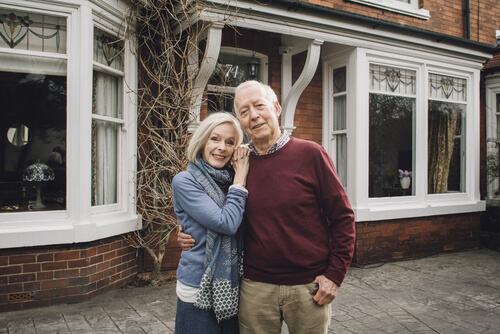
Page contents
People who own property often decide to sell it when they move into a care home. The rules on whether they can claim local authority funding or will have to pay their own care home fees will change according to if they own their home separately or if it is a jointly-owned property.
This could be because they want to use the money to pay for their care home fees, or because they are applying for funding and the local authority has included their home as an asset.
Some people are financially able to keep their home and pay for care. They may even rent it out to generate income towards their care costs.
How is funding for my care calculated?
If you are applying for funding towards your care, the local authority will conduct a means test to establish how much funding you are eligible for. This is when they add up your capital, which is your assets, savings and investments, and your income. How much this total comes to determines whether you are eligible for full funding, partial funding or if you have enough money that you must pay privately.
To be required to self-fund your care home fees, your total capital must be valued above:
- England: £23,250
- Scotland: £35,000
- Wales: £50,000 (for residential care)
In order to qualify for local-authority funding, your total capital must be valued below:
- England: £14,250
- Scotland: £21,500
- Wales: £50,000 (for residential care)
To qualify for partial funding, your total capital must be valued between:
- England: £14,250 and £23,250
- Scotland: £21,500 and £35,000
Are jointly-owned properties included in the means test?
If your partner still lives there
If your partner is still living in your jointly owned property, it will not be included in the means test which determines whether you pay care home fees.
Separated but still living together
People who are separated or divorced, but still living together, will find the property will be included in the means test, unless they also care for your child (who is under 18), a relative who is over 60 or a disabled relative. The person they care for must also live in the property for it to be excluded from the means test.
Staying in a care home temporarily (respite or convalescence)
The property won’t be counted if you are going to a care home temporarily or if you are having a means test because you want to receive home care.
Separated and not living together but you jointly own the property
If you have separated from your partner and no longer live together, but still have equal shares in the property, you will be considered to have half of what the property is worth.
So, if you and your spouse own a house worth £300,000, and the mortgage is fully paid off, you will be considered to have £150,000 in assets for the house alone.
If the shares are unequal then your assets will be calculated accordingly.
Can my partner still live in our jointly-owned property?
If your property isn’t included in the means test, your partner will be able to continue living there. If it is included, it may be necessary for them to move, depending on the individual circumstances.
12-week disregard period
You will have a 12-week disregard period, starting from the day you move into a care home. For these 12 weeks, your share in the property won’t be taken into consideration for your care fees funding.
This gives you time to decide what to do with the property, such as putting it on the market or getting a landlord licence and finding tenants.
Deferred Payment Agreement
You could also apply for a Deferred Payment Agreement (DPA). This is an agreement with your local authority whereby they take money owed to them from the sale of your home.
This allows you to delay using this asset to pay for your care, often until after your death. You will have to pay administration fees for this, and interest does accrue over time.
Not everyone is eligible so if you are interested in applying for a DPA, speak to your local authority.
Can I give my home to my children?
Some people believe that signing the deeds of their home over to their children is a good way to avoid inheritance tax and having to pay privately for care home fees.
You are within your rights to give away your home, but this may be seen by the local authority as a deliberate deprivation of assets. In this case, they will still count the property as part of your assets when calculating your funding, even though you now cannot use them.
This is something you should be very careful with, as it may cause problems if you need the money you are considered to have to pay for your care home fees, but it is now in the hands of your children.
If they are not willing to sell the property and use the money for your fees, they are within their legal rights and can keep it, meaning that you will likely have to move to a lower-budget care home.
Also, if they go bankrupt or get divorced, that home is part of their assets and they could lose it before they would have inherited it anyway, had you not given it to them early.
Furthermore, if the property is worth more than £325,000, you need to survive for seven years after you sign it over for it to no longer count as part of your taxable estate.
Find your ideal care home
- Explore a wide range of care options and facilities
- Read independent ratings and reviews
- Connect directly with care homes to book a tour and discuss your needs


